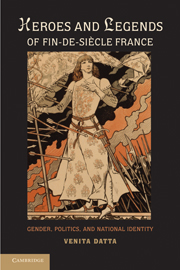Book contents
- Frontmatter
- Contents
- Acknowledgments
- Introduction: The Fin-de-Siècle Cult of Heroes
- 1 Gender, Class, and Heroism in the Bazar de la Charité Fire of 1897
- 2 Cyrano: A Hero for the Fin de Siècle?
- 3 “L'Appel au Soldat”: Visions of the Napoleonic Legend in Popular Culture
- 4 On the Boulevards: Representations of Joan of Arc in the Popular Theater
- 5 Opium, Gambling, and the Demimondaine: The Ullmo Spy Case of 1907–1908
- Conclusion: From One War to the Next: The End of Heroes?
- Selected Bibliography
- Index
Conclusion: From One War to the Next: The End of Heroes?
Published online by Cambridge University Press: 05 June 2012
- Frontmatter
- Contents
- Acknowledgments
- Introduction: The Fin-de-Siècle Cult of Heroes
- 1 Gender, Class, and Heroism in the Bazar de la Charité Fire of 1897
- 2 Cyrano: A Hero for the Fin de Siècle?
- 3 “L'Appel au Soldat”: Visions of the Napoleonic Legend in Popular Culture
- 4 On the Boulevards: Representations of Joan of Arc in the Popular Theater
- 5 Opium, Gambling, and the Demimondaine: The Ullmo Spy Case of 1907–1908
- Conclusion: From One War to the Next: The End of Heroes?
- Selected Bibliography
- Index
Summary
My father spoke in 1897, to a generation weaned on faith; he felt in some mysterious way that this was a generation destined to die. … These young men who listened to him, these hearts who would submit to the soul of Cyrano, console themselves with his panache, these are already the condemned men of 1914.
Thus wrote Maurice Rostand in his memoirs published in 1948. Fifty years earlier, Edmond Rostand had exhorted young schoolboys at his alma mater to imitate the panache of Cyrano. There is certainly evidence to indicate that many young French men entering into battle during the First World War had taken this lesson to heart. Notwithstanding the hyperbolic nature of Rostand fils's comment and the hindsight involved, it is true that French soldiers took copies of Cyrano de Bergerac to the front with them and that they also performed the play in the trenches. Rostand himself regularly received letters from poilus (soldiers), who saw the great author as a national icon, indeed, an honorary uncle.
If Rostand was France's cherished elder statesman, his friend and fellow icon Sarah Bernhardt was her grande dame, a personification of France itself. Bernhardt, who by this time was in her seventies, lost a leg to amputation in 1915.
- Type
- Chapter
- Information
- Heroes and Legends of Fin-de-Siècle FranceGender, Politics, and National Identity, pp. 226 - 238Publisher: Cambridge University PressPrint publication year: 2011



